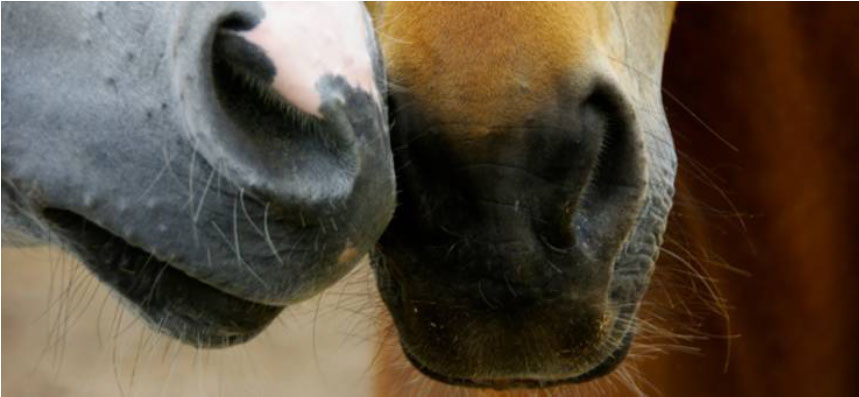
By Kentucky Equine Research Staff
Domestication means that horses, in general, have decreased pasture access, less time with other horses, and very different feeding practices compared to their undomesticated peers. To maximize the welfare of managed horses and avoid unwanted behaviors, owners may implement various environmental enrichment strategies. While big, bouncy balls may immediately spring to mind, olfactory stimulation is a more subtle form of sensory enrichment.
Experts believe horses have a well-developed sense of smell. Using odors to enrich a horse’s life may therefore prove to be an inexpensive, simple means of providing stimulation or fostering quietness.
“Olfactory stimulation may increase behavioral diversity, allowing horses to behave more naturally, to deal with stresses and challenges, and to stimulate species-typical behaviors,” explained Catherine Whitehouse, M.S., nutrition advisor for Kentucky Equine Research.
According to a recent review on olfactory stimulation in horses, some smells may prove valuable in modern horse management.*
- Other horses’ odors: Horses commonly greet one another nose-to-nose and nose-to-body, so body odors are relevant for social contexts. When horses are in isolation—when trailering to an event alone, for example—providing a cloth that was rubbed on a familiar horse’s coat may help calm the horse during this time of stress.
- Equine-appeasing pheromone: The equine-appeasing pheromone may also be calming in stressful situations. “This pheromone is released by nursing mares. It reportedly provides reassurance to the foal, helping it feel safe, protected, and confident in novel situations. Synthetic versions of the equine-appeasing pheromone may help all horses, not just nursing foals,” advised Whitehouse.
- Essential oils and plant-derived odors: One published study showed that lavender decreased heart rate, alert postures, defecation secondary to stress, and salivary cortisol levels. “Lavender is perceived as the best-documented calming essential oil; however, spikenard, a perennial herb from the Himalayas, and roman chamomile were both found to be better at inducing relaxation than lavender in one study,” Whitehouse added. “That said, another found that chamomile did not consistently show a consistent relaxing effect.” Other essential oils tested in horses with variable results were cedarwood and peppermint.
More research on the role of olfactory stimulation in enriching horses’ environments is warranted. This may help horses deal with various stresses in their lives such as social isolation and the introduction of novel objects or new environments.
“Horses are exposed to many stressors in their daily lives, many of which may not be fully appreciated by owners. Stress can lead to a plethora of digestive issues and can affect the immune system as well as the microbiome through the concept of the ‘gut-brain axis,’” said Whitehouse.
She added, “Dietary imbalances or nutrient gaps may be exacerbated under stressful situations, so it cannot be overstated how important it is to provide a complete and balanced diet.”
Digestive support can help neutralize excess acid in the digestive tract and support the microbiome when potential stressors can be neither removed nor minimized in the horse’s environment. EquiShure is a time-released buffer that helps maintain an appropriate pH in the hindgut, thereby stabilizing the microbiome.
Reprinted courtesy of Kentucky Equine Research. Kentucky Equine Research is an international equine nutrition, research, and consultation company serving horse owners and the feed industry. Our goals are to advance the industry's knowledge of equine nutrition and exercise physiology, apply that knowledge to produce healthier, more athletic horses, and support the nutritional care of all horses throughout their lives. Learn more at KER.com.
There a more informative articles in our section on Health & Education.
*Bini de Lima, A.C., V.C. Sebastião da Fé, M.S.Palermo Hernandes, V.M. Oliveira Dos Santos. 2023. Olfactory stimulation as environmental enrichment for domestic horses-A review. Animals (Basel) 13(20):3180.

































